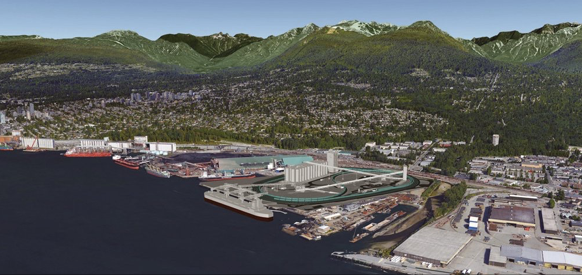Western Canadian grain shipments continue to grow against the background of Bill C-49: An Act to amend the Canada Transportation Act and other Acts respecting transportation
Image: G3 Terminal in Vancouver – set to become Vancouver’s first new grain terminal since the 1960’s. The terminal is nestled between Neptune Terminals to the west and Lynnterm Terminal to the east.
As we heard at the Institute of Chartered Shipbrokers annual Dry Bulk Commodities Conference in Vancouver on November 16, Canadian grain shipments are continuing to expand against a background of legislative reforms contained in Bill C-49 which is currently before the House of Commons.
On behalf of the Quorum Corporation, which provides such data to the Canadian Government, the Director of Research and Analysis, Bruce McFadden detailed a number of telling statistics for the 2017-17 crop year:
- Primary Elevator Shipments 45.6m MT (7.7% greater than 2015-16 & 2014-15 (42.4m MT each year)
- Western Canada Originated Rail Traffic 50.7m MT (5.0% greater than 2015-16)
- West Coast grain shipments through Vancouver and Prince Rupert 36.8m MT (3.3% higher than 2015-16 & 8.2% higher than 2014-15)
- Q1 2017-18 Primary Elevator Shipments 11.7m MT (2.6% greater than Q1 2016-17)
The breaking of new records adds weight to the decision of most grain handling terminals in the Port of Vancouver to invest in storage and handling capacity increases and loader modernization, but also validates the decision of the G3 Consortium* to build a new state-of-the-art 5m tons/year capacity terminal in North Vancouver, a project which is already under construction. At the same time, Parrish and Heimbecker has applied to build a new 4m tons/year grain terminal on the Fraser River at Fraser Surrey Docks.
The new capacity will be further complimented by conversion of Fibreco Terminal also on the North Shore,, to handle agricultural commodities in addition to its traditional business of wood chips and pellets. Further to these projects is the new Ray-Mont transload facility in Prince Rupert which was commissioned in July 2017. The accumulated additional capacity will come as a major boost to Prairie farmers and governments who have long been campaigning for more west coast grain export capacity.
With respect to railway transportation, Bill C-49 proposes to amend the Canada Transportation Act as follows:
(a) Provide that the Canadian Transportation Agency will offer information and informal dispute resolution services;
(b) Expand the Governor in Council’s powers to make regulations requiring major railway companies to provide to the Minister of Transport and the Agency information relating to rates, service and performance;
(c) Repeal provisions of the Act dealing with insolvent railway companies in order to allow the laws of general application respecting bankruptcy and insolvency to apply to those companies;
(d) Clarify the factors that must be applied in determining whether railway companies are fulfilling their service obligations;
(e) Shorten the period within which a level of service complaint is to be adjudicated by the Agency;
(f) enable shippers to obtain terms in their contracts dealing with amounts to be paid in relation to a failure to comply with conditions related to railway companies’ service obligations;
(g) Require the Agency to set the inter-switching rate annually;
(h) create a new remedy for shippers who have access to the lines of only one railway company at the point of origin or destination of the movement of traffic in circumstances where inter-switching is not available;
(i) Change the process for the transfer and discontinuance of railway lines to, among other things, require railway companies to make certain information available to the Minister and the public and establish a remedy for non-compliance with the process;
(j) Change provisions respecting the maximum revenue entitlement for the movement of Western grain and require certain railway companies to provide to the Minister and the public information respecting the movement of grain; and
(k) Change provisions respecting the final offer arbitration process by, among other things, increasing the maximum amount for the summary process to $2 million and by making a decision of an arbitrator applicable for a period requested by the shipper of up to two years.
* G3 is a partnership between Bunge Ltd. and Saudi Agricultural and Livestock Investment Co. (SALIC). Terminal construction commenced in March 2017 and is scheduled for completion in 2020.

